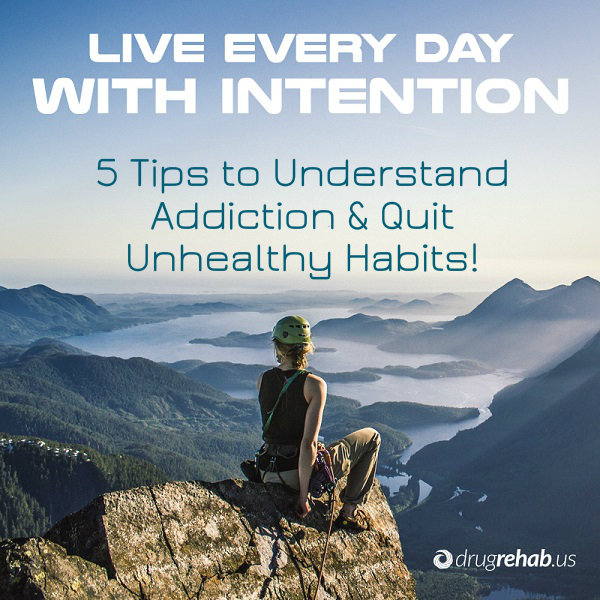19 Jan 2015
Is Your Partner A Compulsive Gambler?
Gambling can be a fun, and sometimes profitable pastime, but it is an activity that can easily spin out of control. It goes by many names: compulsive gambling, problem gambling and pathological gambling. Whatever you call it, gambling addiction is a serious problem that can lead to severe negative consequences.
Signs And Symptoms That Your Partner Is A Compulsive Gambler
If you suspect that your boyfriend or husband has a problem with gambling, you should learn to recognize the signs of an addiction and sit him down for an important conversation about slowing down or getting help.
Early Signs Of Problem Gambling
No addiction starts out at full speed. If your partner has a problem with gambling it probably started out innocently enough. Maybe he had a big win at a casino trip and wanted to keep trying to win again. Maybe he started playing online poker after work to unwind and now can’t stop.
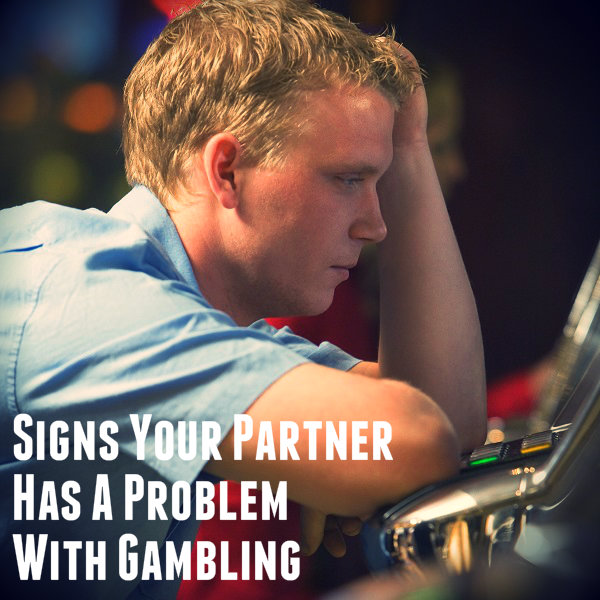 If he is in the early stages of compulsive gambling, you have a good chance of convincing him to make some changes. Early signs and symptoms of gambling include:
If he is in the early stages of compulsive gambling, you have a good chance of convincing him to make some changes. Early signs and symptoms of gambling include:
- A preoccupation with gambling.
- Lying about time spent gambling or amounts of money lost.
- Gambling to soothe negative emotions such as stress, depression or anxiety.
- Cutting out other interests and hobbies in favor of gambling.
- Gambling in spite of negative consequences, such as big losses or arguments about time spent gambling.
- Trying to cut back on gambling time, without much success.
Symptoms Of A Gambling Addiction
The early signs of a gambling problem may be hard to recognize or pin down. They may be mild enough that you and your partner are able to deny that there is an issue. If you don’t confront the problem you could be facing a worsening obsession with gambling and even an addiction or a case of pathological gambling. Here are some signs that your partner has a serious problem with gambling and needs help:
- He feels restless, irritable and anxious when he can’t get to the casino or to an online gambling site. These are symptoms of withdrawal and a sign of a behavioral addiction.
- He has developed a tolerance. This means that his usual time spent gambling doesn’t feel like enough anymore. He needs to spend more and more time gambling to feel good.
- He is experiencing serious financial setbacks because of gambling and yet continues to do it. A hallmark of any addiction is continuing in the face of serious negative consequences. For gamblers, this usually means losing a lot of money. He may even lose his job because of missed time or gambling online while at work.
- He takes extreme measures in order to gamble more. This may mean stealing to fund his habit or taking out big, risky loans.
- He experiences manic episodes when winning and severe depression when losing. His emotions are deeply tied to his gambling.
What To Do If You Believe Your Partner Has A Problem With Gambling
Compulsive gambling is a serious problem and is one that can tear relationships apart. If your partner is exhibiting any of the signs of having this problem, it’s time for an important discussion.
Approach your partner with concern and compassion and suggest that he may have a problem. Explain how his gambling is impacting your life and your relationship and offer to help him quit or cut back. If he refuses help or is in denial, don’t give up. Ask other family members or friends to confront him as well and be prepared with options for getting professional help.
Take steps now, before it is too late and your relationship is completely destroyed by gambling addiction.
Do Heroin And Gambling Addicts Share Similar Brain Changes? – Find Out Now
Do You Or A Loved One Need Help With A Substance Or Behavioral Addiction?
Call Us Now To Take The First Step Toward A New Life…You Are Worth It!
12 Jan 2015
Codependents And Their Drug Of Choice…The Addict
Codependents are people who love addicts or alcoholics. While the alcoholic or addict is obsessed with his or her drug of choice, the codependent’s drug of choice is the addict. The addict is obsessively chasing his or her next high while the codependent is addicted to the drama and the challenge of bringing everything under control.
If The Addict Gets Sober It Doesn’t Mean The Problems Go Away
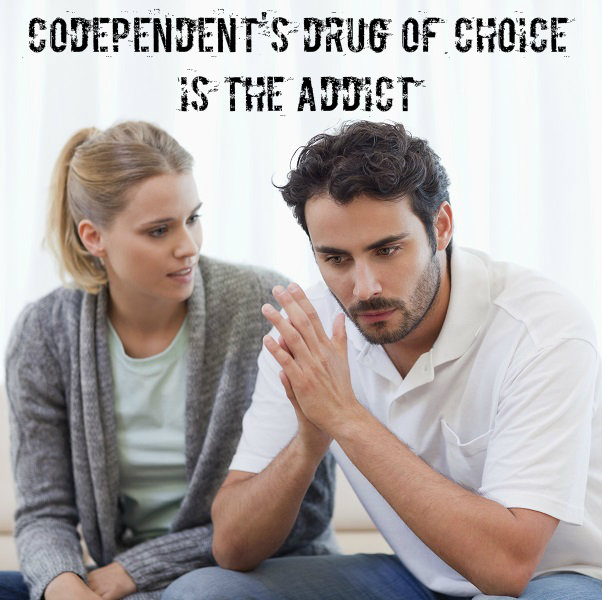 It’s not intentional, of course. If you’re involved with an addict, you probably believe with all your heart that once he or she gets sober, everything will be fine.
It’s not intentional, of course. If you’re involved with an addict, you probably believe with all your heart that once he or she gets sober, everything will be fine.
You believe the root of all of your problems is the addiction, and if the addict would only stop abusing drugs, life could go back to normal. So you keep trying to fix him.
It’s not that simple. Even if the addict gets sober, you will continue to relate to each other in unhealthy ways. In particular, you will probably continue to try to control or obsess about the addict even when he isn’t revolving his life around drugs.
Involved With One Troubled Person After Another
Many codependents find that even if they end a relationship with one addict, they immediately get involved with another one. If you have codependent tendencies, you may wonder why you seem to get involved with one addict or troubled person after another. You seem to be perpetually drawn to people who are emotionally unavailable. For one thing, thinking about them and their problems allows you to avoid thinking about your own.
Sooner or later, every codependent has to face the fact that the real problem isn’t all about the addict.
Characteristics Of Codependents
People who have a problem with codependency share certain characteristics that offer clues to why they are drawn to troubled people. Here are some of them.
- You put the needs of others before your own – Codependents are quick to put their own needs aside so that they can be constantly available to other people. The root of this tendency is low self-esteem.
- You desperately seek solutions outside yourself – Drug addicts look for substances outside themselves to fix their problems and alter their moods. As a codependent, so do you. You look for people to revolve your life around and alter your mood.
- You tend to take on too much responsibility – This leads you to do for others many things that they should be doing for themselves. You do more than your share most of the time, and eventually you feel overwhelmed and resentful.
- You have a deep fear of abandonment – You are terrified of being alone. In your relationships, you may put up with treatment that you know is unacceptable, but you are more afraid of being abandoned than you are of being abused. Being left alone is one of the worst things you can imagine.
- You constantly try to please people and you feel unappreciated – You want people to like you so much that you’re always trying to please them. You give and give and give some more, but no one seems to notice or appreciate you. You avoid asserting your own needs or getting into any kind of conflict.
- You lose yourself in relationships – You get so wrapped up in your relationships that you can barely remember who you are. You might give up your hobbies so you can be available to your loved one, or you might even change your core beliefs. Your conversations are always about what your loved one is doing, what his interests are, and what he wants. You rarely talk about yourself or think about yourself.
Recognize You Have A Problem And Get The Help You Need…And Deserve!
Codependents put a great deal of effort and energy into other people’s lives, but have a great deal of trouble focusing on their own. They get caught up in other people’s emotions, feeling happy when others are happy and sad when others are sad.
If you are a codependent, you are probably so other-focused that you don’t even realize you have a problem. Recognizing you have a problem is the first step toward recovery. Help is available through therapy and support groups such as Alanon. If you commit to getting past codependence, you will learn to focus on yourself and your own life, and to put your energy into changing what you can—yourself.
Believe In Yourself – You Are Worth It & Always Have Been…Always
Addictions come in many forms, ranging from the more obvious examples such as heroin or cocaine addiction right through to more subtle forms such as food, sex or social media addiction.
Although they might seem like distinct issues, they’re all described by the word addiction because they share many similarities, and they can all be helped in the same basic way. Writing in the U.K. newspaper The Telegraph, therapist David Smallwood shares five tips for understanding addiction and overcoming unhealthy habits.
Tips For Understanding Addiction And Quitting Unhealthy Habits
1. Determine Your Vice
The fact that not all addictions conform to the stereotypical image of persistent drug or alcohol abuse means it’s not as easy as you may think to work out whether you have an addiction or what the subject of it is. Remember that more socially acceptable activities, such as drinking cup after cup of coffee, working 12-hour days, going to the gym every day and eating sugar or fat-laden foods can also be the subjects of addictions. Smallwood suggests that asking a friend to critique your lifestyle may reveal some issues you aren’t aware of, even if it isn’t always a pleasant experience.
2. Learn And Avoid Your Triggers
Compulsive behaviors are a core feature of addiction, and these compulsions are brought on by internal and external “triggers.” These are feelings or situations that lead you to crave your substance or activity of choice, such as loneliness, anger, exhaustion, stress, depression or hunger. Once you identify the factors that are most crucial in creating your cravings, the goal is to break the link between the triggers and the resulting behavior. For example, if you feel stressed or irritable, you should consider calling a friend or family member, taking deep breaths, having a warm drink or taking a calming walk. Smallwood emphasizes the importance of breakfast; if you skip it, mounting hunger cravings throughout the day may be misconstrued as cravings for your substance or activity of choice.
3. Practice Mindfulness And Stay In The Moment
The basic premise of mindfulness—staying “in the moment”—is a useful tip for managing anxieties associated with attempting to remain abstinent. The goal is to focus on the now rather than getting caught up in the past or future; in Smallwood’s words, “Focus on what you are doing, rather than what you are not doing.” Take a walk and focus on the sensory information you’re absorbing; pay attention to the vibrant colors and silky textures of flower petals or the chirping of courting birds rather than being lost in regrets from the past or fears about the future. Practice meditation to improve this skill: simply sitting for 20 minutes or so and trying to focus on one thing (such as your breathing) can help empty your thoughts and bring about mindfulness.
4. Tackle The Underlying Problem
One common problem you may encounter when trying to overcome addiction is “cross addiction.” You might quit smoking, for example, only to “fill the gap” by overworking or overeating. In reality, the real cause of addiction is something deeply rooted, not the specific substance or behavior. If you switch from smoking or drug abuse to overeating, you’re just swapping one addiction for another. Smallwood jokingly compares this to swapping deck chairs on the Titanic; it’s not exactly the same situation, but you’re still heading for trouble on the same boat. Identify the root cause of your addiction (addiction treatment professionals are invaluable in this area) and work on overcoming it, rather than allowing it to manifest in a new way.
5. Set Goals
If you’ve resolved to overcome addiction, it’s important to establish what you’re trying to achieve. Setting definite goals gives you something to work toward, and later down the line, it can help you appreciate how far you’ve come. Smallwood suggests choosing a point of time—two months in the future, two years in the future, whenever suits you—and writing yourself a letter detailing your current lifestyle and how you’d like it to have changed at your chosen date. Put it in an envelope and keep it somewhere prominent and noticeable, with your chosen date written on it. The closed envelope will serve as a reminder of your goals, and when the date arrives, you can read the letter and see if you’ve been successful in your intentions. Taking a step back and examining your lifestyle like this can give you the motivation to keep working to improve yourself and your life.
You DO Have What It Takes To Overcome Addiction!
Beating addiction isn’t easy. It’s a fiendish enemy that can hide in the shadows, change appearances like a chameleon and come back into the fray when you least expect it. But that doesn’t mean you can’t do it, and with the right support and a positive mindset, you do have what it takes to make a change in your life. These five tips don’t cover every aspect of the issue, but they provide a useful, at-a-glance run-through of the core steps in overcoming addiction. If you keep these lessons in mind and work to implement them in your life, you’ll soon be on your way to regaining control and getting your life back on track.
Inspirational Recovery Posts – Be Informed & Inspired!
24 Nov 2014
The Transfer Addict
There is an often-overlooked type of addict who struggles just as much as any other. She is unlikely to get help. She is unlikely to recognize her own problem or to have her loved ones see it in her. She is the transfer addict and she flies under the radar choosing one addiction, reining it in and gaining control and then moving on to the next one. She fools herself and those around her, but she is a true addict and she needs help.
Substitute Or Transfer Addictions
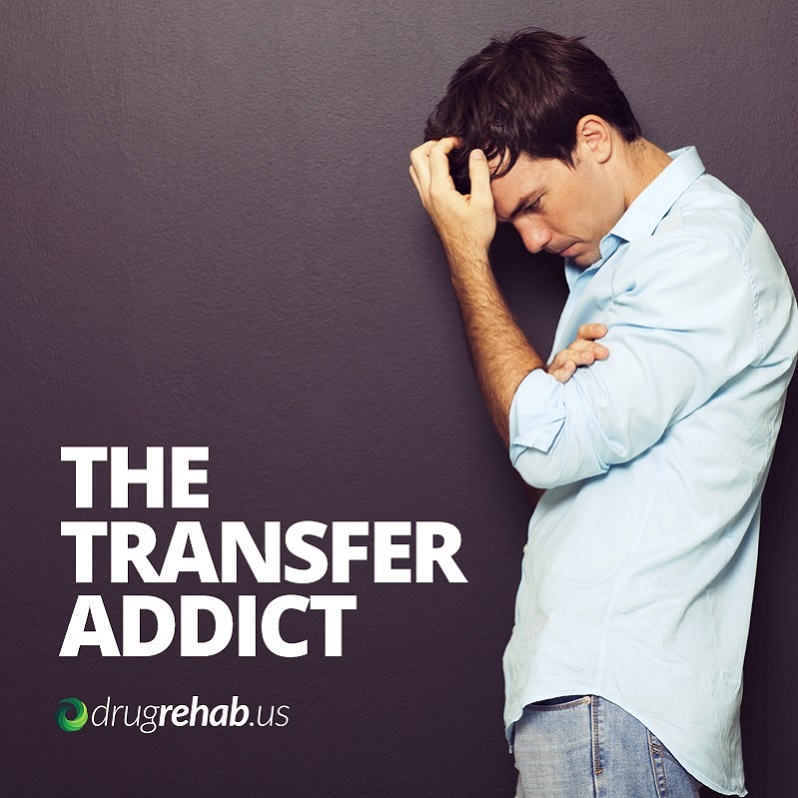 Changing from one addictive substance or behavior to another is not uncommon for an addict. But most who engage in this behavior are obvious, at least to those around them if not to themselves.
Changing from one addictive substance or behavior to another is not uncommon for an addict. But most who engage in this behavior are obvious, at least to those around them if not to themselves.
Addicts in recovery are susceptible to developing a substitute addiction because they are trying to replace their compulsive urges with other activities. An addict might, for instance, start running as a healthy distraction from the urges to relapse.
Setting and achieving race goals and getting physically fit is a great way to stay sober, but an addict might turn this into an unhealthy obsession and develop a new addiction to exercise or running.
Another form of the transfer or substitute addiction is when an addict still in the throes of the disease thinks changing to a less serious substance means regaining control.
For instance, a cocaine addict might switch to marijuana use. This is a common way in which an addict transfers his high, but it is simply the substitute of one substance for another and does not represent control over an addiction.
The Low-Flying Transfer Addict
While substitute addictions are not uncommon, there is another type of addict that flies low and under the radar. This addict has one unhealthy obsession, maybe drinking too much, but she is able to get it under control before it becomes a full and serious addiction.
She assures her friends and family that, yes, she probably drinks more than is good for her, but she has it under control. She does this, not by recognizing her obsessive behaviors, but by transferring them to something new.
She stops drinking and starts obsessing over food. She binge eats and starts gaining weight. Before long she is overweight, but decides to rein it in and get it under control. She assures everyone she is well by changing her diet and starting an exercise regime. She loses the weight, but now she is addicted to working out and meeting that next exercise goal.
This transfer addict may never let herself reach the level of full-blown addiction to one substance or behavior, but she displays all the compulsions of an addict. Her compulsive behaviors evolve and change, but she never copes with them. They never go away.
Breaking The Cycle Of Transfer Addiction
If the description of a transfer addict sounds familiar to you, it’s time to break the cycle. Whether it’s you or someone you know, transfer addictions need to stop in order to build a healthy lifestyle.
Addiction of any type has no cure, but it can be managed successfully. Whether this means getting professional help or using self-education and self-control to resist urges, you or your loved one can stop the destructive cycle of transfer addictions.
If you do try to go it alone, be aware that you might fail. If you can’t seem to control your behaviors and urges, don’t get discouraged. It just means that you need the assistance of an experienced professional.
Call Us Now For Help Overcoming Your Substance Or Behavioral Addiction – We Are Here For You!
03 Nov 2014
Drinking And Stress: A Dangerous Combination
Do you have a glass of wine to unwind in the evening after work? Do you reach for a cocktail after a stressful situation? Do you start to look forward to your evening drink earlier in the day when you’re feeling stressed? If you can say yes to any of these questions you are probably using alcohol to cope with stress. Drinking can make you feel momentarily looser, calmer and more relaxed, which is why many people use it to unwind. Doing so is a dangerous habit, though. You can make your stress worse by drinking and even risk becoming dependent on it.
Alcohol As Stress Relief
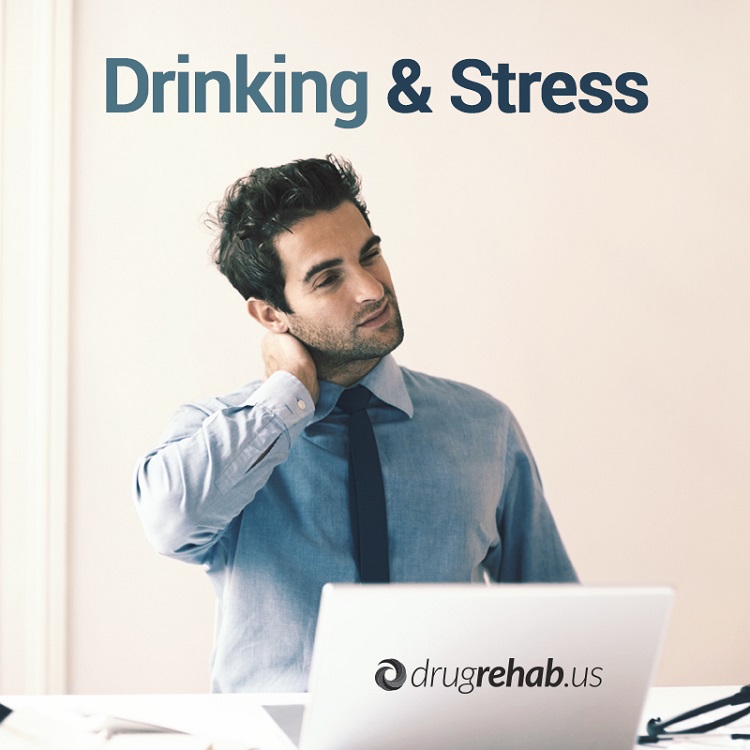 Many people turn to drinking to relax and ease the everyday stresses of modern life. Most of us are busier than ever. We have demanding jobs, and in a rough economy, holding onto those jobs becomes crucial. We often sleep poorly and get too little exercise. Our diets are not always the best. On top of all this you may have other stresses in your life: troubled relationships, financial problems, trauma, a death in the family, etc.
Many people turn to drinking to relax and ease the everyday stresses of modern life. Most of us are busier than ever. We have demanding jobs, and in a rough economy, holding onto those jobs becomes crucial. We often sleep poorly and get too little exercise. Our diets are not always the best. On top of all this you may have other stresses in your life: troubled relationships, financial problems, trauma, a death in the family, etc.
Why wouldn’t you want to drink to feel better? Hanging out with friends at the bar and having a few cocktails or beers are fun activities. It’s no wonder many of us engage in drinking to diffuse stress. In the short term it can make you feel better, especially when you add in the socializing time with friends. In the long term, however, drinking can send your stress levels spiraling upward.
The Stress-Drinking Cycle
Researchers have shown that stress and drinking effect each other and result in a cycle of interaction that leads to worsening stress. One study found that alcohol changes how the body copes with stress. Drinking can actually reduce the stress hormones your body produces in difficult situations, but it also prolongs the tension that you feel associated with stress.
On the flipside, stress changes the way alcohol impacts your mood. When you are stressed and you drink you will crave more alcohol. You will also find that the positive feelings you normally get from alcohol are reduced. This interaction between stress and alcohol that goes on inside your body means that drinking actually worsens your stress. As your stress gets more intense, you may drink more and the cycle continues. Drinking will never cure you of chronic stress.
If you continue to use alcohol as a means of relaxation and stress relief you run the risk of falling into the stress-alcohol cycle. And if you land in that cycle you could end up becoming dependent on alcohol. Alcoholism is a disease and it takes a serious toll on both the mind and the body. Becoming an alcoholic means more stress in addition to physical health problems.
Healthy Stress Relief
One of the ways in which friends can be good for your mental health is when you interact in a social group. Having good social support can make you more resilient in the face of stress. Hanging out with friends and family, talking, laughing and having a good time helps to relieve stress that you already have. If you can keep the social engagements, but take out the alcohol, or at least reduce it significantly, you will have a powerful prescription for managing your stress. Add to your social interactions a healthy diet, plenty of exercise, downtime engaging in fun activities and you have a healthy stress relief plan and no need for that next drink.
Do You Find Yourself Drinking More And More To Relieve Stress? Call Us Now For Help!
16 Oct 2014
How To Prevent And Correct Video Game Addiction
What do you do if you have a child, most likely a son, who plays Internet or video games obsessively? How do you know if he has gone too far and spends too much time gaming? And how do you get him to cut back? Whether an addiction to gaming is diagnostically real is up for debate by the experts, but the fact remains that people can become obsessed with gaming to the detriment of other aspects of their lives. It’s important for parents to monitor a child’s gaming and set limits if it gets out of hand.
Gaming Addiction?
 The Diagnostic and Statistical Manual of Mental Disorders is the number one resource for diagnosing any kind of mental disorder or condition, including addiction. In the latest edition, DSM-5, experts decided not to include Internet gaming disorder as a diagnosable condition. They did, however, list it in a section for potential disorders requiring further research. This means that there is a possibility that Internet gaming and video gaming can be problematic for individuals and can approach addictive-like levels.
The Diagnostic and Statistical Manual of Mental Disorders is the number one resource for diagnosing any kind of mental disorder or condition, including addiction. In the latest edition, DSM-5, experts decided not to include Internet gaming disorder as a diagnosable condition. They did, however, list it in a section for potential disorders requiring further research. This means that there is a possibility that Internet gaming and video gaming can be problematic for individuals and can approach addictive-like levels.
DSM-5 describes gaming disorder as characterized by compulsive playing, avoiding other activities and interests in favor of gaming, and distress or impairment as a result of these behaviors. Some obsessive gamers even experience withdrawal-like symptoms when their games are taken away. It turns out that this issue of compulsive gaming is a real problem with some kids. Research has found that among boys who game, 12 percent fit the definition of addicted, while 8 percent of girls do.
Preventing And Correcting Obsessive Gaming
Whether or not this obsessive level of gaming gets labeled as an addiction is largely unimportant. As long as experts recognize that some young people truly have a problem with gaming and have the resources to help them, labeling doesn’t matter. If you are the parent of a child who enjoys gaming, be aware of the issue and be prepared to act if you think your child has a problem.
Signs Of A Problem With Gaming
First it is important to recognize the signs of a problem. Your child may be at risk of a gaming addiction if he can’t seem to stop playing, even when you repeatedly ask him to stop. He may also lie about how much he plays games and may start to lose interest in other activities he used to enjoy. Others signs of a problem are slipping grades or being tired from gaming too much. If your child is already showing some of these signs and you can’t get him to stop, it may be time to get some professional help. A good therapist, recommended by your pediatrician, will be able to help get you started.
If your child is not yet showing signs of a problem, but you’re still worried, there are some steps you can take to avoid a gaming addiction. Start by setting limits. Your child should not have free reign to play games whenever and for as long as he wants. Set aside a certain time during the day and do not allow gaming at any other time. Another great way to get kids off of games and devices in general is to engage in family activities unrelated to technology. Take a hike together, go to the park, go to the pool or take a camping trip and outlaw devices for the duration.
It is also important to talk to your child about your concerns. Explain how it is easy to get obsessed with certain activities, like gaming, and how that can be bad for you. Being open with your child is a great way to foster trust and communication and to help him understand why you set limits.
Read This Post To Find Out If Your Child Is Addicted To Gaming, The Signs And What To Do
14 Oct 2014
Are You Addicted To Love?
Process addictions, also known as behavioral addictions, don’t always get the same kind of attention as chemical dependencies, but they can be just as serious. Love addiction, which should not be confused with sex addiction, can prevent you from having normal relationships or from ever being satisfied with one. If you are constantly obsessing over one person, a fantasy of your true love or a fantasy relationship, you could be suffering from a love addiction. It’s time to break the cycle.
What Is Love Addiction?
Love addiction is a process addiction. This means that instead of compulsively using a drug or alcohol, you are addicted to a behavior, a feeling or a person. In the case of love addiction you may be addicted to the feelings of infatuation or early love and go through a string of short-term relationships.
 Or you might be addicted to your partner and the way he makes you feel, refusing to break it off even if the relationship takes an unhealthy turn. It could even be platonic love that has you hooked. The bottom line is that you obsess over it. The feelings you get from love, infatuation and fantasy take over your life.
Or you might be addicted to your partner and the way he makes you feel, refusing to break it off even if the relationship takes an unhealthy turn. It could even be platonic love that has you hooked. The bottom line is that you obsess over it. The feelings you get from love, infatuation and fantasy take over your life.
At the root of a love addiction is the idea that another person, either real or imagined, can make your life perfect and love you unconditionally. This idea may result from a past history of being abandoned or not being loved enough. It may be that your parents didn’t meet your needs for love and affection. Now, as an adult, you have low self-esteem and look for validation from an outside source when really you should be your own validation.
How Do I Get Over A Love Addiction?
Love addiction is unhealthy because it means that you place unrealistic expectations on others, you fail to take care of yourself and you fail to develop a healthy relationship of mutual respect and love. If you recognize the signs of love addiction in your actions, thoughts and feelings, it’s time to take action and turn things around. Only then will you learn to love yourself and give yourself the chance to have a real relationship.
Steps To Get Over Love Addiction
Here are some steps to take:
- Stop, analyze and assess – Take a step back from your relationships and really think about your behaviors. Make a list of the ways in which you behave inappropriately in your relationships. Consider how you feel and how you make your partner feel. Also think about past relationships and look for common patterns.
- Take responsibility for your own happiness – As a love addict you rely on someone else to make you happy. You think that you need a perfect partner to make your life complete. This is a mistake. You are the only one who can make you happy. Accept that now and begin to act on this truth.
- Consider therapy – There is a good chance that your obsession with love is related to your past. Working with a therapist can help you come to terms with past relationships and how they have impacted you. Sometimes it takes the assistance of a professional to really heal.
- Be prepared for imperfection – As you feel ready to start up a new relationship be ready for the fact that it won’t be perfect. You can chase a perfect partner your whole life, but you’ll never find him. Prepare yourself to fall in love with someone who is imperfect, but perfect for you.
Breaking the habit of love addiction isn’t easy, but it will make your life infinitely better. Only when you begin to accept and love yourself, and reject the idea of a perfect fantasy partner, will you be ready to enjoy real love.
03 Oct 2014
Top 5 Most Addictive Behaviors
Drugs and alcohol are not the only things that can lead you down the path to a dangerous obsession and addiction. Behaviors can be addictive too. Experts call these behavioral or process addictions and they can be nearly as damaging as a drug addiction or alcoholism.
Most of us will not become obsessed with a behavior or activity to the point of addiction, but none of us are completely risk-free. Learn what the experts say are the most potentially addictive behaviors so that you can avoid getting hooked on them. While you need not avoid these activities entirely, you should be aware that they can lead to addictive behaviors.
Top Behavioral Addictions
Researcher Dr. Reef Karim, a specialist in behavioral addictions, reviewed studies to find which behaviors are the most addictive.
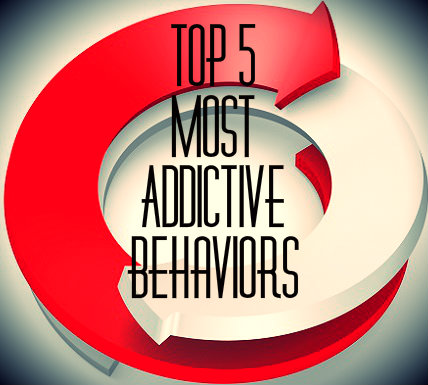 Gambling – Gambling tops that list. Gambling disorder affects two percent of the population and is the only behavior that gets widespread support as a true behavioral addiction. Much research on problem gambling has been conducted and has found that gamblers experience a high when winning, similar to the experience of drug use. They also experience withdrawal when not gambling, including physical symptoms like headaches and insomnia.
Gambling – Gambling tops that list. Gambling disorder affects two percent of the population and is the only behavior that gets widespread support as a true behavioral addiction. Much research on problem gambling has been conducted and has found that gamblers experience a high when winning, similar to the experience of drug use. They also experience withdrawal when not gambling, including physical symptoms like headaches and insomnia.
- Internet And Gaming – This type of addictive behavior is a recent addition, but a powerful one. Most experts agree that Internet gaming disorder is a real problem for some people and one that is very similar to drug addiction. Much of the evidence for Internet addiction being a real disorder comes from Asia. Young men there in particular have become so obsessed with gaming that they stop eating and neglect all other responsibilities, including the care of children. This level of obsession is similar to what drug addicts experience.
- Sex Addiction – That sex can become addictive is not surprising. The experience activates the reward system in the brain, as do drugs and alcohol. While regular and frequent sex with one partner is not unhealthy, obsessive sexual activities are. Compulsively using pornography, looking for sex with strangers or engaging in exhibition are behaviors that are considered signs of an unhealthy obsession with sexual activities.
- Eating – Food also activates our reward centers, especially foods that are high in fat, sugar or salt. Eating disorders like bulimia and anorexia are dangerous and involve compulsive behaviors, but they are not addictive disorders. Compulsive overeating, on the other hand, shares characteristics with drug and alcohol addiction. Also known as binge eating, this behavior includes obsessing over food. Compulsive eaters tend to spend an unnatural amount of time thinking about food, planning meals, and frenzied eating to the point of getting sick. Between two and four percent of Americans may struggle with binge eating.
- Shopping – Compulsive shopping is controversial among experts. Some think it can be classified as a behavioral addiction, while others are on the fence. More research is needed to clarify, but it seems that buying something you really want activates the reward system in your brain. Developing this obsession is harmful because it can lead to serious financial problems.
There are a number of behaviors that can become obsessive, but these five are the most common. Just like a drug addiction, these behaviors can cause you to engage in them compulsively, ignore your responsibilities, develop withdrawal, experience highs and ultimately even ruin your life. Be aware of the possibility of behavioral addictions and look for signs of obsessions in yourself and those you love so you can get professional help if needed.
Read Our Other Behavioral Addictions Posts


